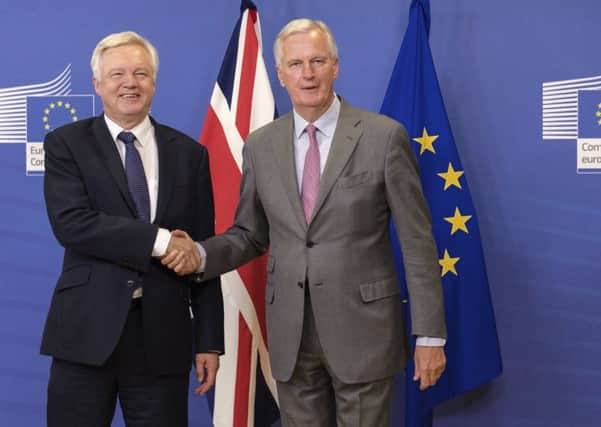UK calls for greater '˜flexibility' as Brussels warns of '˜fundamental' disagreements in Brexit talks


The Haltemprice and Howden MP maintained an optimistic tone in the wake of the latest round of meetings in Brussels, describing discussions as “robust” and claiming there was “a lot to be positive about”.
However, his EU counterpart – the commission’s chief negotiator Michel Barnier – spoke of a “fundamental” disagreement between the two parties on the question of citizens’ rights, with the supremacy of European Courts flagged up as a key sticking point.
Advertisement
Hide AdAdvertisement
Hide AdHe also stressed the need for greater “clarification” from the British government on multiple issues, before repeating his warning that the UK’s financial obligations “must be settled” before it quits the bloc.
The commission has already made clear its disapproval of Britain’s offer on the future rights of EU nationals, arguing that the guarantees do not go far enough.
Although the UK Government has confirmed that citizens who have been resident for at least five years will be free to apply for “settled” status, many in the EU would like to see this extended to include future family members.
Speaking at a joint press conference today, Mr Barnier added that the commission is also clear that it wants the European Court of Justice (ECJ) to continue ruling on issues relating to citizens’ rights.
Advertisement
Hide AdAdvertisement
Hide AdHe stated that this was not a “choice” or a “political point”, but a legal “obligation”.
“There does remain one fundamental divergence on the way in which such rights would be guaranteed, and on several other points,” he said.
“Simply, if there is to be continuity of EU law, that has to be framed by case law of the court... It’s not a choice, it’s an obligation.”
He went on to reaffirm the EU’s position on the timetabling of talks, stating its support for an “orderly” withdrawal process that sees an agreement on the UK’s financial settlement reached before any talk of a future trade deal.
Advertisement
Hide AdAdvertisement
Hide AdHowever, he suggested there was a lack of “clarification” in the UK position on payments, adding: “As soon as the UK is ready to clarify the nature of its commitments, we will be prepared to discuss this with the British negotiators.”
Ending the supremacy of the ECJ in UK law has long been a red line for Theresa May. And reports that the EU could demand up to £66bn from the UK as part of the exit deal have met with fierce resistance from eurosceptics within her own party.
Responding to Mr Barnier, Mr Davis acknowledged that “further work” was needed before negotiations over the divorce bill can be “resolved”. He stated that while talks had been “constructive” there was still “a lot left to talk about”.
But he also stressed the need for “flexibility” from both sides, as he urged all parties to work towards an agreement “in the spirit of mutual cooperation”.
Advertisement
Hide AdAdvertisement
Hide Ad“All in all, the second round of negotiations have given us a lot to be positive about,” he said.
“And they have also highlighted the need for both sides to demonstrate a dynamic and flexible approach in the way we approach these challenges.
“We have conducted this round constructively and at pace, and I hope this is a model we can continue going forward.”
His optimism failed to convince Labour and Lib Dem critics, with Shadow Brexit Secretary Keir Starmer describing the “lack of progress” as “deeply concerning”. “On issues such as the rights of EU citizens in the UK and UK citizens in Europe... we learn today that there remain ‘fundamental divergences’... This means more waiting and more anxiety for millions of families.” he said. “The reality is that we have a Government that is unprepared, divided and incapable of securing a good deal for Britain.”